Scaffolding Freshwater Isle of Wight: When starting a renovation or construction project, homeowners in Freshwater will commonly find the need for scaffolding to be an essential factor. Beyond its utility for professional contractors, scaffolding is an indispensable safety measure, assuring that high-altitude tasks are carried out with both safety and efficiency. For tasks ranging from exterior house painting to roof repair, scaffolding delivers a secure platform that facilitates easy task execution by workers. Turning our focus to the world of scaffolders and scaffolding through the lens of a property owner, we aim to underline its importance, the selection journey, and the pivotal considerations.
A Brief Guide to Scaffolding: A system allowing builders to operate safely and securely at height and reach otherwise inaccessible places on houses, commercial buildings and other structures, scaffolding is made up of a framework of steep tubes and fixtures which when bolted together create a sturdy working platform. Protecting the general public and occupants from hazards like falling debris is likewise an important function of scaffolding, helping to make the general environment less dangerous. A thorough risk assessment will likely be required to confirm if a scaffold is necessary for any particular project.

A scaffold is made using many different sections which will likely include: sole boards, base plates, ladders, putlogs, ladder clamps, sills, right angle clamps, ledgers, diagonal braces, standards, facade braces, spade ends, swivel clamps, midrails, board clamps, couplers, guard rails, scaffold boards, toeboards and limpet clamps.
Dependant upon what purpose you require a scaffold for, you will soon realise that there are many different sorts of scaffold including double scaffolds (masons scaffolding), single scaffolding, patented scaffolding, confined space scaffolds, scaffold towers, trestle scaffolds, rolling scaffolds, tube and fitting scaffolds, suspended scaffolding, cantilever scaffolds and shoring scaffolds. The most likely kind that you'll use on your house in Freshwater, is the single or bricklayer's scaffold. Nonetheless, any one of the aforementioned kinds might be needed if it is a commercial building or premises that's having the work done on it.
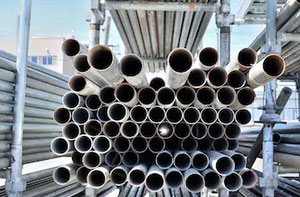
If you need to get scaffolding in Freshwater, you must search for an expert scaffolding contractor, who is advocated by your local council. A number of safety checks will have to be carried out on the scaffolding, and these need to be done before its used, routinely every 7 days, after adjustments and modifications and after bad weather. If it encroaches onto the a public highway or pavement, you'll need to get authorization from the local authority. This scaffolding licence will be vital if you are putting up pedestrian barriers, hoardings, access towers, scaffolding, stagings and also if you're siting a skip or contractors plant. The scaffolding must also have safety lighting if it is situated on a public highway, any professional scaffolding contractor will provide this. Scaffolding in the UK has to observe the European Standard, BS EN 12811-1, which stipulates performance requirements and techniques for the design of access and working scaffolding.
When looking for scaffolders in Freshwater, you'll likely be aware of a couple of scaffolding companies operating in the locality. Those conspicuous advertising hoardings on scaffolds throughout the area, they can be quite difficult to overlook. You can start your selection process with a basis of familiarity with these local businesses. To broaden your choices, think about sending a request via Bark, a platform that connects you with local scaffolders, making the process more efficient. This approach results in considerable time and hassle savings. Rapidly, you'll amass a substantial list of prospective scaffolders, enabling a knowledgeable choice for your renovation or construction and ensuring a scaffolding solution that meets your needs, is efficient, and safe.
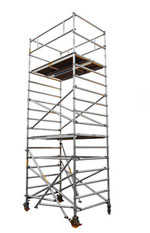
Scaffold Tower Hire Freshwater - A scaffolding tower may be more than enough if your building project is just a limited one, meaning you'll have a lot more options. You will be able to hire a tower scaffold from building merchants, tool hire companies and sometimes even certain scaffolding companies will be prepared to hire you one. Jewson, HSS, Hire Station, Travis and Perkins and other tool hire providers close to you will be good places to begin your hunt for a suitable scaffold tower.
Since they need to be easy to move on site and also easily transported, lightweight aluminium is usually used in the making of scaffold towers. Numerous different styles and sizes are generally available to pick from. Among the more readily available designs are non-conductive towers, folding indoor towers, double width scaffold towers, microfold towers, cantilever scaffold towers, 1-man towers, folding low level platforms, stairwell access towers, span access platforms, podium steps, tower bridging decks, single width scaffold towers, guard rail scaffold towers and similar bespoke scaffolding towers. It could possibly even turn out more cost-effective for you to purchase a basic tower scaffold, if you've got a lot of work to do on your house.
Knowledge of the various components and styles of scaffolding available is a must if you're undertaking a construction project that requires it. The article discusses scaffolding as a complex system of tubes and fittings that are clamped and fastened together to provide a secure platform for working at height.
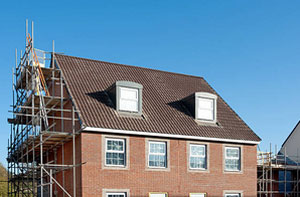
The article doesn't mention that scaffolding systems can include additional features like loading bays, hoists and stairwells to facilitate the transfer of building materials and equipment to and from the scaffold platform.
When choosing a scaffolder in Freshwater, ensuring their approval by the local authority and adherence to required safety guidelines is of utmost importance. This includes routine safety checks before and during the use of the scaffold, together with obtaining any necessary permits for scaffolding that encroaches on a pavement or public highway.
Prioritising safety is crucial for business owners and homeowners alike with regards to scaffolds. Selecting a competent and reputable scaffolder in Freshwater can guarantee the completion of your building project in a safe and efficient manner.
The Skill of the Scaffolder: Construction with Safety in Mind
The procedure for setting up scaffolding is complex and necessitates unique skills. Here is an overview of the vital qualities that contribute to a good scaffolder:

Technical Expertise:
- Component Knowledge: With an understanding of the different elements of a scaffold system, including platforms, braces, couplers, tubes and base plates, scaffolders know how each component functions and collaborates to establish a stable and safe construction.
- Reading Blueprints: An expert eye for detail is essential for scaffolders. They study blueprints to understand the specifications and layout they need to build from. This includes dimensions, weight restrictions, and the crucial placement of anchor points for the structure.
- Structural Integrity: With their considerable knowledge of load-bearing capabilities, they expertly calculate the weight distribution on the scaffold and recognise any possible weak areas, affirming the scaffold's strength to safely support the combined load of materials, equipment and workers.
Physical Abilities:
- Agility and Balance: Building scaffolding typically involves navigating tight spaces and moving through a complex network of metal, sometimes at considerable height. For secure and safe traversal, scaffolders need to demonstrate remarkable balance and agility.
- Strength and Stamina: Given that parts of a scaffolding system are often heavy, scaffolders need to possess significant stamina and strength to position, lift and fix the components while erecting the scaffold.
- A Head for Heights: The nature of the job inherently involves being at considerable height. It's vital for scaffolders to feel confident working aloft and to have a strong sense of spatial orientation.
Focus on Safety:
- Inspection Procedures: Scaffolders are trained to conduct routine inspections as part of the essential measures for preserving a safe work setting, quickly identifying and resolving problems like damaged parts, loose components or faulty joints to avoid accidents.
- Fall Protection Protocols: The training for scaffolders comprehensively covers fall protection measures, including the appropriate utilisation of personal protective equipment (PPE) such as harnesses, safety nets and lanyards, ensuring that fall protection gear is used correctly by each person working on the scaffold.
- Safety Awareness: Scaffolders on construction sites undertake the role of safety monitors, diligently ensuring the scaffold satisfies safety standards. They're also tasked with the responsibility of reporting any unsafe work practices or possible threats to the safety of others.
Communication Skills:
- Clear Communication: In their role, scaffolders engage closely with engineers, supervisors and other construction workers, with effective communication being vital for a mutual comprehension of the scaffolding strategy, potential dangers and load capacity limits.
- Problem-Solving Skills: Unforeseen obstacles can arise during scaffolding projects, requiring scaffolders to have excellent problem-solving capabilities to devise solutions and adjust their strategies without compromising on safety guidelines.
Refining these crucial skills allows scaffolders to enhance the safety and streamline the execution of construction projects. They're pivotal to the construction industry, providing the support necessary for others to confidently climb to new heights.
Thorley Street, Bouldnor, Shalcombe, Chessell, Freshwater Bay, School Green, Afton, Norton Green, Totland, Pound Green, Easton, Hulverstone, Thorley, Norton, Brook, Yarmouth and more nearby places, are within the operating range most Freshwater scaffolding companies.
Scaffolding Signage
 Any scaffolding system used in maintenance or construction projects must have appropriate scaffolding signage to serve as an alert to workers and the general public about potential hazards. The purpose of the signage is to inform the workforce and the public about the presence of scaffolding and the hazards it poses. Scaffolding signage can include directional signs, warning signs and information signs, such as contact information for the scaffolding contractor or emergency services.
Any scaffolding system used in maintenance or construction projects must have appropriate scaffolding signage to serve as an alert to workers and the general public about potential hazards. The purpose of the signage is to inform the workforce and the public about the presence of scaffolding and the hazards it poses. Scaffolding signage can include directional signs, warning signs and information signs, such as contact information for the scaffolding contractor or emergency services.
The signs need to be noticeable and easy to read from a distance, while complying with relevant health and safety legislation. The use of scaffolding signage reduces the risk of injuries and accidents by notifying workers and the general public of potential hazards and providing them with vital information. Before commencing the erection of any scaffolding structure, scaffolding companies in Freshwater must make certain that the proper signage is installed. Scaffolding signs can function as a wayfinding tool, assisting workers and visitors in navigating the site, especially in vast and complicated projects, in addition to offering safety information.
Scaffolding Weather Protection
Scaffolding weather protection measures play an essential role in safeguarding worker safety and project efficiency by mitigating the impact of adverse weather conditions. Shielding scaffolding from wind, rain, snow, and other harsh elements is achieved by constructing temporary structures around it.
Scaffolding weather protection systems often employ the following methods:
- Temporary roofs: Constructed using metal frames and waterproof coverings like tarpaulins or polycarbonate panels, these temporary structures provide overhead protection from snow, debris and rain, ensuring uninterrupted work even in harsh weather conditions.
- Scaffold shrink-wrap: This robust plastic sheeting is heat-shrunk around the scaffolding frames, providing a watertight seal and protecting the work area from the elements.
- Encapsulation systems: These involve enclosing the entire scaffolding structure with weatherproof materials, creating a controlled environment for sensitive work or to contain dust and debris.
The implementation of effective weather protection unlocks a wealth of benefits.
- Minimising debris and dust dispersion: Encapsulated scaffolding systems are effective at containing debris and dust within the work area, minimising their spread into the encircling environment.
- Protecting material quality: Prevents damage to expensive building materials from snow, wind and rain, ensuring their integrity and reducing project costs.
- Protects the environment: Ensuring the surrounding environment remains free from construction-related debris and pollutants, scaffolding weather protection systems safeguard local ecosystems.
- Safeguarding workers from weather extremes: Fosters uninterrupted work despite challenging weather, preventing delays and ensuring the safety of workers in construction projects.
Proper scaffolding weather protection systems are important for maintaining project progress, ensuring the safety of workers, and protecting the environment during construction activities.
Tube and Fitting Scaffolding Freshwater
"Tube & fitting" scaffolding is the most widespread form of scaffolding found on building sites in Freshwater and across Isle of Wight. Different lengths of aluminium tubing (or occasionally galvanised steel) are fitted together in a framework with the help of unique clamps, couplers and clips. By looking at the precise requirements of each construction site in Freshwater, tube & fitting scaffolds can be set up in a host of designs and configurations, making it an incredibly flexible solution. Tube & fitting scaffolds can easily be made to conform to the relevant Work at Height Regulations in relation to falling objects, by adding things such as toe boards, safety netting, sloping catch fans and brick guards.
When is Scaffolding Necessary
Any kind of structure that's being taken down, built or significantly repaired is probably going to require scaffolding. The size does not matter, nor whether it's industrial, public or domestic. A multi-storey office block that's being knocked down will have a scaffold that is dismantled from the top down as the structure's height reduces. Scaffolds can be obtained for any of those prerequisites and virtually any function you can think of.
Cuplock Scaffolding Freshwater
Developed by a company called SGB, the first, and many would claim the finest, of the "module" or "system" scaffolding products is Cuplock (or Cuplok®). Now among the most regularly used scaffolding systems around the globe, Cuplock owes much of its popularity to its simplicity, cost-effectiveness, and versatility. Adaptable for use in a number of locations and situations, Cuplock has a clever locking mechanism, and is fast and simple to use in curved structures, facade scaffolding, shoring structures, loading towers, stairway scaffolds, birdcage structures and mobile scaffolding towers. With construction contractors and companies in Freshwater constantly trying to find ways to save cash, Cuplock has continued to grow in popularity, particularly over the last 30 years or so. Utilizing a "cup and blade" arrangement, with a twist action to fasten the different standards and ledgers together, Cuplock is a galvanised "module" or "system" scaffolding.
Safety Tips for Scaffolding in Freshwater
You can easily avoid falls from scaffolds in Freshwater by following a few vital safety tips. It doesn't really matter whether you're using a stationary or mobile scaffold, there is always the chance of an accident. Regardless of the form of scaffold that is being used, compliance with safety guidelines is a must, because serious injuries commonly result due to falls from up high.
The first step, and perhaps the most vital one, is to make sure there is a competent specialist on-site to manage the scaffold. Any kind of scaffold construction ought to be supervised and overseen by this person. Other services like assistance in scaffold construction, will be provided by any respected scaffolding provider in Freshwater. Nonetheless, to handle any scaffolding problem that arises, a qualified overseer who must always be on hand. Whenever a scaffold is being put up in Freshwater, it's a given that it's vitally important to follow the maker's instructions to the letter. If you've got any questions, do contact the manufacturer's representative and get them clarified.
It is imperative to make sure that no one works on the scaffolds, whether it's a stationary or mobile scaffold during stormy weather conditions. It is during windy weather that a lot of the accidents involving falling from heights normally occur in Freshwater. During such weather conditions, it's the duty of the supervisor to make sure that scaffolds are a "no-go" zone. Before any worker climbs on to a scaffold, it should be checked whether it's leaning to one side or unsteady. Before working on any kind of scaffolding, it should be compulsory for everyone to check this. This will result in a drastic decrease in the amount of workplace accidents.
Supporting a scaffold with concrete blocks or loose bricks, is a mistake that should not be made under any circumstances whatsoever. Try to remember, if the manufacturer says that a foundation is necessary for scaffolding, especially if it's going to be erected on a hard surface, then it's in your best interests to follow this recommendation.
When using a mobile scaffold, it is vital that you chock or wedge the wheels to eliminate movement. With aluminium scaffolds, the chance of rolling is very high, due to the fact that it's extremely light. Therefore, it is extremely important that you make certain the wheels have been locked.
Lastly, moving a mobile scaffold while someone is working on it, is an absolute no-no. This blunder is the most widespread cause of fall accidents from scaffolding.
The Main Components of a Scaffold
- Base Jack
- Toeboards
- Putlogs
- Standards
- Diagonal Braces
- Base Plates
- Ledgers
- Midrails
- Scaffold Boards
- Guard Rails
Scaffold Boards Freshwater
Just about everyone recognises scaffold boards and will have seen them frequently on construction sites and projects in and around Freshwater. Quite a few householders in Freshwater may even have scaffold boards located somewhere in their garden or home, which are used for different purposes. Scaffold boards are generally thought of as strong and durable and are often employed for raised beds in the garden, for bridging muddy lawns, across ladders for decorating, and a thousand other possible uses. That said, a number of these uses can be dangerous, and we are most certainly not advocating any of those uses here!
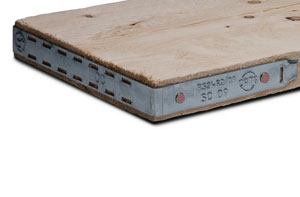
The correct and intended use of scaffold boards in Freshwater is actually to provide a strong and safe platform for people working at height on scaffolds. They're generally placed horizontally along scaffold lifts, and are given support at intervals which will be based upon the grade or quality of the boards being used.
Scaffold boards in Great Britain are generally available in lengths ranging from 5 feet (1.5m) to 13 feet (3.9m), and are commonly 225mm wide and 38mm thick. Easily identified as they have a galvanised metal band at both ends, timber scaffold boards require this additional protection to help stop them from splitting and support the exposed end grain of the board. Scaffold boards are not necessarily all fabricated from wood, and they come in various different types and grades.
The Different Types of Scaffold Boards
Grade "A" Scaffold Boards - Scaffolders all over Great Britain have for several decades considered grade "A" scaffold boards to be the default type of board, and used them on-site as standard. The fact of the matter is, that grade "A" scaffold boards aren't up to British Standards requirements, and whilst they seldom break, they shouldn't be the first choice for use on a building project.
BSI Standard Scaffold Boards - Satisfying British Standards (BS 2482:2009), this sort of scaffold board is the recommended grade for use on building projects in Freshwater. These are either visually or machine graded and should be so stamped on the metal band on the end. To fully satisfy the recommendations these scaffold boards should be supported at least every 1.2 metres (3.9 ft).
Flame Retardant Wooden Scaffold Boards - If there's a need for timber scaffold boards that are flame or fire retardant to Class C of BS EN 13501-1 (British Standards), these can be purchased.
Metal Scaffold Boards - Very durable and strong, galvanised metal scaffold boards are flame retardant and are compliant with British Standards (BS EN 12811-1).
Plastic Scaffold Boards - Scaffolding contractors in Freshwater sometimes also use plastic scaffold boards which are more durable, are more resistant to water and rot and are anti-slip.
Temporary Roofing
One style of scaffolding that is often used on properties in Freshwater, is temporary roofing. When extensive work is being carried out on a roof, this scaffolding is employed to shield the inside of the house from the weather. It is not only domestic homes that need protecting with temporary roofing scaffolds of course, they are also beneficial for industrial premises and offices. They can be connected to a pre-existing scaffolding framework or erected as separate structures. They can even be mobile, so that if they have to be shifted along as the construction work advances, this is possible. Such projects as loft conversions, fire damaged properties, new builds and roof replacements are excellent candidates for the use of temporary roofs.
Scaffold Debris Netting
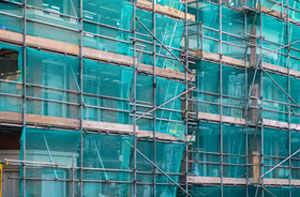
Construction site management and safety are improved through the use of scaffold debris netting. On construction sites in Freshwater, cleanliness, safety and efficiency are all improved by strategically installing this protective mesh material on scaffolding structures to prevent the release of debris.
The key role of scaffold debris netting is to improve safety for both passers-by and workers, who are both beneficiaries. By acting as a formidable barrier, the risk of falling objects from overhead work zones is effectively reduced. This precautionary measure protects the on-site personnel, pedestrians, passers-by, and surrounding areas from potential hazards. The netting mitigates accidents, property damage and injuries by confining construction materials, tools and debris to the work area.
Not only does scaffold debris netting provide safety benefits, but it also significantly contributes to site management and organisation. By collecting and containing debris, it aids in maintaining a tidy and clean workplace. The generation of a considerable amount of debris by construction sites can lead to a disorderly and unsafe atmosphere if not properly managed. The netting's ability to keep the site clean improves overall operational efficiency while also enhancing safety. Clutter-free workspaces enable workers to focus on their tasks without distractions, while managers can make certain that the workplace complies with the appropriate regulatory standards.
The careful design of debris netting is a response to the unique demands of building sites. Adverse weather conditions, the rigours of construction activities and prolonged exposure are all withstood by this hard-wearing, engineered product. The netting's lightweight quality persists, even with its durability, ensuring ease in installation and manoeuvreability. Prompt installation and removal where necessary are made possible by the simplicity of its application, which adds to the efficiency of construction projects.
The contribution to an orderly and safe workplace by the netting extends beyond its immediate benefits. Continuous adaptation to evolving conditions is imperative within the dynamic realm of building sites. Scaffold debris netting's versatility becomes obvious as it seamlessly integrates into various construction projects. The netting's adaptability ensures that safety and site management remain paramount during various tasks, whether it's a repair project, a new build or a renovation.
In conclusion, scaffold debris netting's importance in the construction sector lies in its dual role, which guarantees safety and facilitates site organisation. Its role in averting falling debris and augmenting cleanliness makes construction work spaces much safer. Builders, by prioritising the installation of debris netting, affirm their dedication to creating a secure environment for workers and encircling areas, a key factor in their projects' all round success. (57930 - Scaffold Debris Netting Freshwater)
More Freshwater Tradesmen: When you're seeking out Freshwater scaffolders, you could likewise also be in the market for window installaton in Freshwater, painters and decorators in Freshwater, loft conversion in Freshwater, roofing companies in Freshwater, roof cleaning in Freshwater, bricklayers in Freshwater, solar panel fitters in Freshwater, brick repointing specialists in Freshwater, rendering in Freshwater, brick cleaning in Freshwater, SKIP HIRE in Freshwater, rubbish removal in Freshwater, chimney repairs in Freshwater, gutter cleaning in Freshwater, Isle of Wight.
Scaffolders Near Freshwater
Also find: School Green scaffolders, Thorley scaffolders, Bouldnor scaffolders, Easton scaffolders, Norton scaffolders, Brook scaffolders, Chessell scaffolders, Shalcombe scaffolders, Norton Green scaffolders, Hulverstone scaffolders, Yarmouth scaffolders, Freshwater Bay scaffolders, Thorley Street scaffolders, Afton scaffolders, Pound Green scaffolders, Totland scaffolders and more. There are contractors who specialise in scaffolding near to all of these towns and areas. Making certain that scaffold structures are erected both securely and safely, these versatile specialists bring a wealth of knowledge and expertise. Acknowledging the importance of strict safety standards and regulations, they strive to create a workspace that maximises productive output and reduces risk factors. Local householders can get quotes by clicking here.
Freshwater Scaffolding Tasks
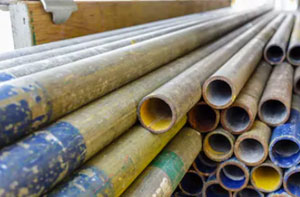
Local Freshwater scaffolders will be happy to help you with HAKI roofing systems in Freshwater, construction scaffolding, reclaimed scaffold boards Freshwater, tube and fitting scaffolds Freshwater, HAKI system scaffolding Freshwater, suspended scaffolding in Freshwater, Cuplok® scaffolds, railway maintenance services Freshwater, scaffold safety fan systems in Freshwater, hoardings, double scaffolds, scaffolding licences, scaffold inspections, industrial scaffolding Freshwater, residential scaffolding Freshwater, bespoke scaffolding Freshwater, scaffold removal Freshwater, decorating scaffolds, system scaffolds, scaffolding signage Freshwater, single scaffolds Freshwater, shoring scaffolding, roof scaffolding, walkway scaffolding, patented scaffolds, stairwell access towers, scaffolding for re-roofing work, aluminium scaffolds, H-frame scaffolding in Freshwater, single man scaffold towers, scaffold shrink wrapping, industrial scaffolds in Freshwater, walkway systems, access scaffolding, module scaffolding and additional scaffolding related services. These are just a selection of the duties that are carried out by those specialising in scaffolding. Freshwater companies will be delighted to keep you abreast of their full range of services.
Commercial Scaffolders Freshwater - Scaffolding Quotes Freshwater - Scaffolding Wrapping Freshwater - Residential Scaffolders Freshwater - Scaffold Hire Freshwater - Temporary Scaffolds Freshwater - Scaffolding Freshwater - Scaffolders Freshwater - Contract Scaffolders Freshwater



